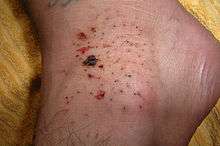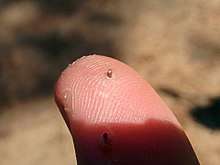Sea urchin injury
Sea urchin injuries are caused by contact with sea urchins, and are characterized by puncture wounds inflicted by the animal's brittle, fragile spines.[1]:431

Sea urchin injury on the top side of the foot. This injury resulted in some skin staining from the natural purple-black dye of the urchin.
Process
Sea urchin spines can be venomous or cause infection. Granuloma and staining of the skin from the natural dye inside the sea urchin can also occur. Breathing problems may indicate a serious reaction to toxins in the sea urchin.[2]
Following injury by a non-venomous sea urchin, the spine can stay for a while inside the flesh, causing pain and discomfort. The spines dissolve after a time, or are expelled from the body.
Additional images

Mediterranean black sea urchin sting being expelled from the body by itself after three weeks
gollark: ?tag lyric2
gollark: ?tag lyricly projects
gollark: Like Macron.
gollark: Some projectors use nanoscale mirror technology somehow. It's called digital light processing.
gollark: Computer monitors don't do cyan that well. There are color space diagrams online, look at "sRGB".
See also
- Bristleworm sting
- List of cutaneous conditions
References
- James, William D.; Berger, Timothy G.; et al. (2006). Andrews' Diseases of the Skin: clinical Dermatology. Saunders Elsevier. ISBN 0-7216-2921-0.
- Gallagher, Scott A. "Echinoderm Envenomation". eMedicine. Retrieved 12 October 2010.
This article is issued from Wikipedia. The text is licensed under Creative Commons - Attribution - Sharealike. Additional terms may apply for the media files.